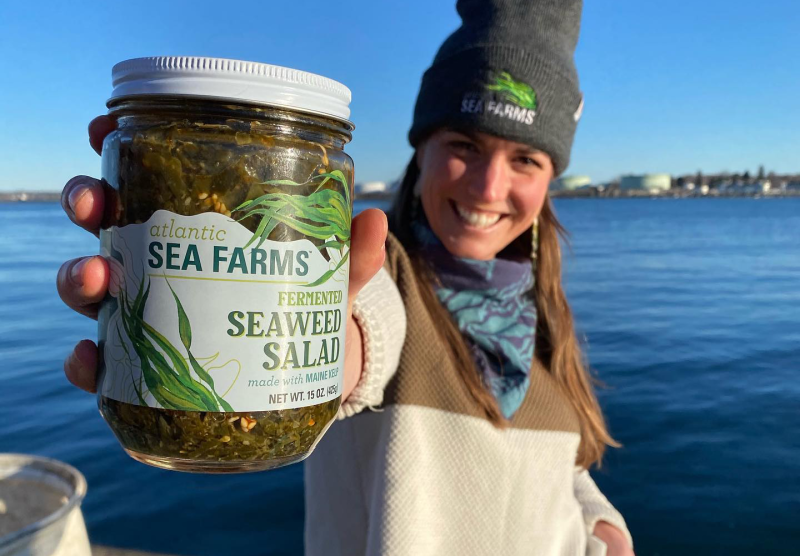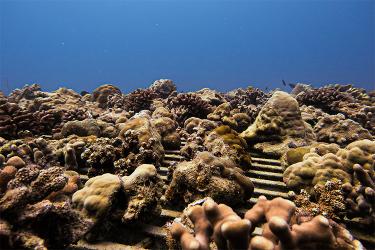In the chilly waters of the Gulf of Maine, Atlantic Sea Farms works with a close community of Maine lobstermen. They grow and harvest skinny kelp and sugar kelp and processes that kelp into culinary products. Through their program Kelp to the Kitchen: Bringing Seaweed and Chefs Together, they also partner with industry personnel to educate others on the culinary uses of seaweed.
Atlantic Sea Farms supports their community of kelp farmers by providing free kelp seeds with a buy-back guarantee that they will purchase the fully raised seaweed at harvest. Additionally, Atlantic Sea Farms’ team provides training, auditing, and support services throughout the season, and assists with farm siting. As a result, the number of Maine kelp farmers has boomed. In just 2 years, Atlantic Sea Farms partner farmers (almost entirely made up of Maine lobstermen diversifying into kelp in their off-season) have come to represent more than 80 percent of cultivated seaweed in the United States.
Atlantic Sea Farms is working to make kelp aquaculture a profitable and viable long-term diversification strategy for working waterfront communities. According to the seaweed company, Maine lobstermen already possess the boats and on the water skills required for growing high quality kelp. They are particularly well positioned to lead in seaweed aquaculture in the United States.
Using the freshly harvested kelp, Atlantic Sea Farms creates unique, nutrient-dense products such as seaweed salad, kelp smoothie cubes, kelp sauerkraut, and kelp kimchi. Chief Executive Officer Bri Warner states, “Our company’s goal is to create craveable products that increase demand for line grown seaweed from Maine. Fresh kelp is both nutritious and regenerative; it’s an ideal way to increase our positive impact on coastal communities and the ocean.”
A Focus on Sustainability
Recently, Warner has pivoted the company to also include helping farmers diversify into kelp to help counter climate change. Growing kelp locally provides a domestic, fresh, healthy alternative to imported seaweed products. It also helps the environment—kelp farming requires no arable land, pesticides, or herbicides and helps reduce ocean acidification effects around farms.
The timing of kelp farming is also convenient for growers. Seaweed is grown in the winter, which is the off-season for lobster. Warner notes that more than 4,000 lobstermen on the coast of Maine can potentially use this crop as an added source of income. Today, Atlantic Sea Farms has 24 partner farmers along the coast, most of whom are lobstermen or fishermen diversifying their income.
From Farm to Table
Farmed kelp is grown underwater on long horizontal lines, about 7 feet below the surface. The lines of kelp stay suspended in the water until harvest time. Fully grown kelp can reach 10 feet long. In addition to the free seeds and buy-back promise, Atlantic Sea Farms provides technical assistance and lease support.
More than 1,300 retailers nationwide carry their seaweed products, including Whole Foods Market, Wegmans, Sprouts, and other natural grocery stores. The farm has also partnered with restaurants such as Sweetgreen, B.GOOD, Legal Seafood, Daily Harvest, and Little Beet to introduce diners to the versatility of seaweed.
Fun Fact
When growing underwater or served raw, kelp is naturally brown in color. It only turns green when exposed to hot water.
Recipe: Superfood Kelp Smoothie
Not sure about seaweed? Try a seaweed smoothie blend.
Ingredients:
- 1.5 cups almond milk
- 1 handful fresh spinach
- 1 frozen banana, cut into pieces
- 1 Atlantic Sea Farms Kelp Cube
- 1 teaspoon honey
- 1/2 teaspoon fresh ginger
- Squeeze of lime
Instructions:
- Place all of the ingredients in a high-speed blender; blend on high until smooth.
Learn more about Atlantic Sea Farms
Sustainable Seafood from Tide to Table
The Tide to Table series profiles members of the aquaculture community, who provide valuable jobs and increase access to fresh, sustainably sourced American seafood. Aquaculture is about more than seafood production. It is about ecosystem stewardship, coastal communities, and economic opportunities.
Sources:





